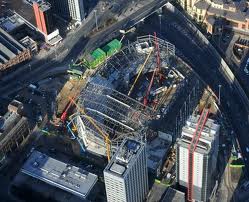Introduction to Leeds arena
The new Leeds arena – One of the largest and most well known cities in the United Kingdom is the city of Leeds. It’s a cultural, sports and shopping hotspot that attracts visitors from all over the world. With its own ballet company, repertory theatre, opera house and listed buildings, the city’s cultural heritage is unparalleled. The Elland Road and Headingly stadiums have also made the city well known for its sports heritage, while the Victorian Quarter has placed it on the map for shopping. It is also under construction and its completion is estimated to boost the city’s profile internationally.
Of all the major cities in the United Kingdom, only Leeds and Bristol do not have an arena. Since the popular Queen’s Hall in Leeds was demolished in 1989, there been several failed attempts for building an arena. Public demand for a major venue within the city has risen over the years. This demand even resulted in a wide scale and well-publicised campaign. Because of this, the Leeds City Council has placed the construction of the arena on its priorities.
It is expected to bring a sweeter future for the city. Its completion is expected to increase the region’s economy by £25.5m per year, along with the city’s tourism. It will also create around 450 jobs and attract world class entertainers, and investing entrepreneurs.
The facts about Leeds arena
The construction of the Leeds Arena started in May 2011 right on the centre of Leeds and is estimated to be completed in 2013. It will have a seating capacity of 13,500 and will be the first fan type arena in the United Kingdom. It is located in Claypit lane, right on the centre of Leeds and very close to rail and bus stations. Drop off points for taxis and coaches will also be set up for the arena. Its location have car parks within a 5-15 minute walk and parking space will be enough even for a sold-out event.
The Leeds City Council has appointed SMG-Europe to operate the arena. SMG will be responsible for naming the arena along with booking artists and managing its events. SMG is also the operator of many arenas all over Europe. The council is the arena’s lead developer and makes sure that construction is in line with SMG’s requirements. These requirements include soundproofing, 24 executive boxes, flexible accommodations for hosting a variety of events, three kitchens, concession and merchandise stands, retail outlets and five-star dressing rooms. It will also have a “super-theatre” configuration.
From concerts, theatre and ice shows to basketball and boxing, the Leeds Arena will host a wide array of events because of its flexible design. Its construction has gotten the people of Leeds excited, and development projects for the city do not just stop here. It is expected that over the next two years, many landmarks and business opportunities will be developed near the Leeds Arena. Who can say no to this? Tourist from all over the globe, along with local residents certainly can’t wait for the completion of the arena.


